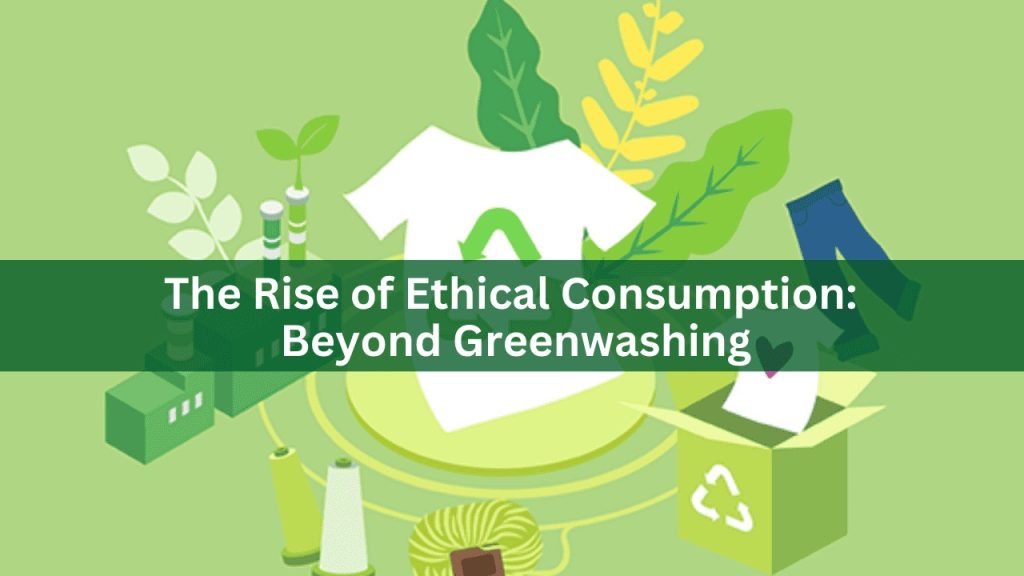
In today’s world, people are becoming more aware of how their choices impact society and the environment. Ethical consumerism is a growing movement that encourages individuals to make purchasing decisions based on moral and ethical values. It goes beyond simply buying eco-friendly products.
It involves considering how goods are produced, how companies treat workers, and whether businesses operate with honesty and fairness. However, as this movement gains momentum, some companies use deceptive tactics known as greenwashing to appear ethical without making meaningful changes.
Understanding Ethical Consumerism
Ethical consumerism means making buying decisions based on more than just price and quality. It involves supporting businesses that prioritize sustainability, fair wages, cruelty-free production, and overall social responsibility.
Consumers today are more interested in knowing the origins of the products they buy. They prefer goods that do not harm the environment, exploit workers, or involve unethical business practices. Several factors contribute to ethical consumerism:
- Sustainability: People choose products made from renewable materials, organic farming, and sustainable practices to reduce environmental impact.
- Fair Trade: Consumers support brands that ensure fair wages, good working conditions, and no child labor in their supply chains.
- Animal Welfare: Many people prefer cruelty-free products, meaning they were not tested on animals or made from animal exploitation.
- Corporate Transparency: Ethical consumers value companies that openly share their production processes and business practices.
The Growth of Ethical Consumerism
The rise of ethical consumerism can be attributed to increased awareness through social media, documentaries, and activism. People now have more access to information about companies and their practices.
Reports about climate change, poor working conditions, and unethical business behaviors have made consumers more conscious of their choices.
Governments and organizations have also introduced certifications like Fair Trade, Organic, and Cruelty-Free labels to help consumers identify ethical products. As a result, brands that genuinely commit to ethical practices enjoy greater customer loyalty and trust.
The Problem of Greenwashing
While ethical consumerism is growing, some companies try to take advantage of this trend through greenwashing. Greenwashing is a misleading marketing practice where companies present themselves as environmentally friendly or socially responsible without making real efforts to improve their practices. This misleads consumers who want to make ethical purchases but are tricked by false claims. Common greenwashing tactics include:
- Vague Labels: Using terms like “natural,” “eco-friendly,” or “green” without any official certification or proof.
- False Imagery: Packaging with images of nature, animals, or leaves to suggest sustainability without any real effort.
- Selective Transparency: Highlighting a few ethical practices while ignoring major unethical aspects of the business.
- Exaggerated Claims: Stating that a product is “100% sustainable” without clear evidence or third-party verification.
How to Identify Ethical Brands
To avoid falling for greenwashing and to truly support ethical consumerism, consumers should take a few important steps:
- Research the Brand: Look up company policies, sustainability reports, and independent reviews.
- Check for Certifications: Reliable certifications like Fair Trade, USDA Organic, Rainforest Alliance, and Leaping Bunny indicate ethical standards.
- Read the Ingredients and Materials: Avoid products containing harmful chemicals, unsustainable materials, or unethical sourcing.
- Support Local and Small Businesses: Many small businesses prioritize ethical production and fair labor practices.
- Be Skeptical of Buzzwords: Do not trust claims that sound good without proof. Verify if a company’s sustainability efforts are real.
The Future of Ethical Consumerism
Ethical consumerism is more than just a passing trend; it is shaping the future of business. As more people demand ethical products, businesses will have to adapt to survive. Companies that genuinely invest in sustainability, fair labor, and transparency will gain a competitive advantage.
Technology is also helping ethical consumerism grow. Apps and websites now allow consumers to scan products and see their ethical ratings. Social media has made it easier to spread awareness and hold companies accountable. With more access to information, people can make better choices and push businesses to do better.
The Way Forward
The rise of ethical consumerism is a positive step toward a better future. It encourages people to think beyond price and quality and consider how their purchases impact the world. However, greenwashing remains a challenge, making it essential for consumers to stay informed and cautious.
By researching brands, checking certifications, and being mindful of misleading claims, consumers can support businesses that genuinely prioritize ethics and sustainability. Ethical consumerism is not just about buying differently; it is about shaping a fairer and more responsible world for everyone.













